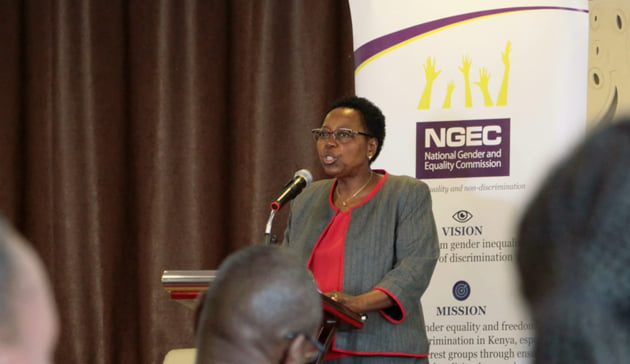STATEMENT ON THE COMMEMORATION OF THE INTERNATIONAL YOUTH DAY
The National Gender and Equality Commission joins Kenya and the global community in commemorating this year’s International Youth Day (IYD). Since 2000, the day is observed annually on the 12th of August. The World Conference of Ministers Responsible for Youth adopted a resolution to proclaim August 12, as International Youth Day at its first session in Lisbon, Portugal in 1998. This resolution was later endorsed by the General Assembly of the United Nations on December 17, 1999 with adoption of Resolution 54/120. The commemoration of IYD is meant as an opportunity for governments and other stakeholders to draw attention to youth issues worldwide.
The theme for this year’s IYD is “From Clicks to Progress: Youth Digital Pathways for Sustainable Development’’.
Digital technology is a catalyst for sustainable development, offering solutions to some of the most pressing global challenges. It enhances access to education, healthcare, and financial services, while also promoting environmental conservation and efficient resource management.
The digital revolution, also refered to as the Third Industrial Revolution, is the change from analog, mechanical, and electronic technology to digital technology. This revolution, presents unprecedented opportunities for young people to contribute to economic growth, social development, and environmental sustainability. Youth hold the key to unlocking sustainable development through digital technology. Their familiarity with technology, coupled with their willingness to experiment and take risks, often positions youth as agents of digital innovation. For example, recently youth have promoted mobile applications that improve productivity, safety, early warnings, artificial intelligence solutions, and future modelling. In Governance, they have established platforms that facilitate reforms in leadership, freedoms, and social justice1.
Kenya has a predominantly youthful population, with individuals under the age of 35 making up approximately 75% of the population, (equivalent to about 35.7 million people (KNBS, 2019)). This demographic expression holds immense potential for revolutionizing the country's economy through digital investments. Indeed, Kenya’s development blueprint: Vision 2030 and the Bottom Up Economic Transformation Agenda (BETA) recognize the importance of digital literacy, access, and connection of digital spaces and technologies as a pivot for spurring commerce, communications, economic growth and accelerated human development.
In response, the Government has implemented several initiatives to harness digital technology for inclusive and sustainable development. They include; a) the Digital Literacy Programme (DLP), which aims to integrate Information Communication Technology (ICT) into teaching and learning in primary schools; b) the Ajira Digital which empowers young people to access digital job opportunities; c) the Konza Technopolis project, envisioned as a hub for technology and innovation, providing a conducive environment for startups and tech-driven businesses to thrive, and numerous county-based, community-initiated, and private sector driven digital innovations; d) the e-Citizen platform, that allows citizens an opportunity to access government services online.
These initiatives have not only narrowed down the digital gap but have also encouraged youth-led initiatives in various sectors, including e-commerce, governance, leadership, agriculture, education, and healthcare. Further, the large-scale movement mounted in the last two months by Kenya youth otherwise branded Gen Z’s, calling for reforms in governance, accountability, and the whole spectrum of development demonstrated the power of digital technology. The youth effectively, consistently, and systematically applied digital social spaces to demand social change.
The Commission commends the Government of Kenya for its efforts in expanding opportunities for youth involvement in the digital economy. However, several challenges still need to be addressed soonest possible. These include reducing the digital divide, especially by increasing access to rural and hard-to-reach areas, as well as to Persons with Disabilities, eliminating high technology costs, inadequate and unreliable infrastructure, and enforcement of patency to innovations from youth.
Youth entrepreneurs have however raised concerns about the prohibitive cost of starting and expanding business including taxes due for youth innovators in music, art, and farming. Additionally, Cybersecurity threats, including cyberbullying, identity theft, Technologically Facilitated Gender-Based Violence (TFGBV), and online harassment, fraud, and hacking/scam, phishing, pose significant risks to the youth.
Addressing these challenges requires coordinated efforts from governments, the private sector, civil society organizations, and youth to invest in digital infrastructure, promote inclusive and adaptable policies, and support community-based digital literacy programs. Strengthening cybersecurity measures, promoting digital citizenship, and educating young people about online privacy and safety practices are essential for creating a secure digital environment where youth can thrive.
As we commemorate the 2024 International Youth Day, the Commission urges the Government and non-State actors, to continue fostering an enabling environment for digital innovation and entrepreneurship directed to the youth. We should all endevour to empower the young people to realize their full potential. The Commission reaffirms its commitment to promoting gender equality and freedom from discrimination to the youth of Kenya.
Wishing all the Youth in Kenya a happy International Youth Day!
SIGNED
Dr. Joyce M. Mutinda, PhD, EBS
Chairperson
The National Gender and Equality Commission
NGEC Chairperson Dr. Joyce Mutinda


Comments